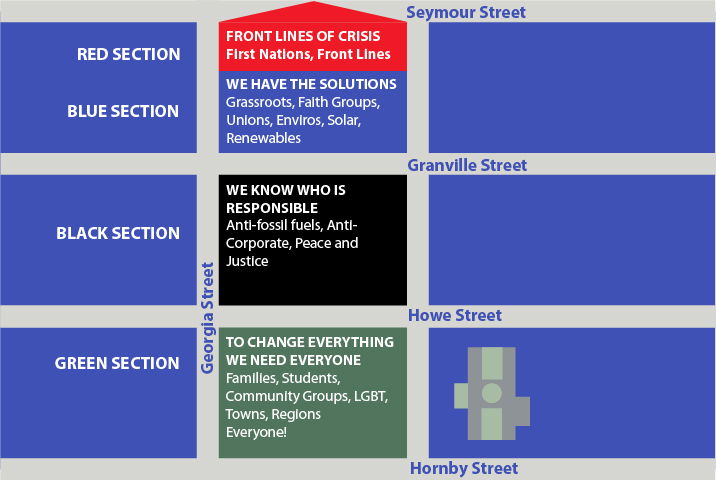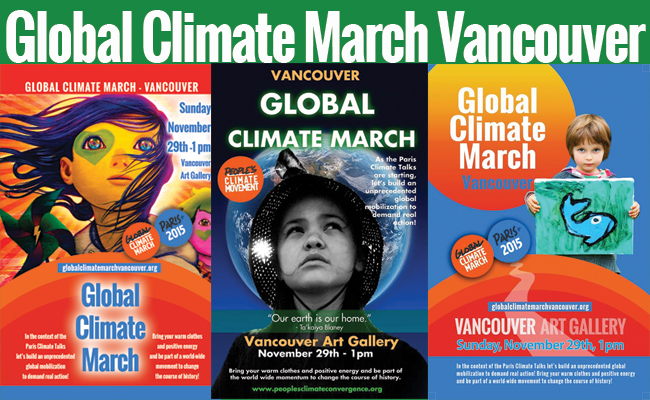rabble is expanding our Parliamentary Bureau and we need your help! Support us on Patreon today!
On November 29th, the eve of the Paris Climate Conference (COP21), Vancouver will join Ottawa as one of the two largest Canadian expressions of the Global Climate March. A coalition of organizations under the banner of Vancouver Climate Convergence is coalescing a broad range of organizations to vocalize support for consequential outcomes from the Paris conference.
Discourses of climate action are focused on the “two degree target” widely recognized as a symbol of the “point of no return” that sets the world on a course of runaway climate change and consequent catastrophic breakdown in economic, political and social conditions. Countries have submitted “pledges” in diverse scenarios to reduce emissions by certain amounts below benchmarks within given timeframes.
But the COP meetings over the past 20 years have failed, as yet, to set us on course, as emissions have risen every year since. There are solid early indications that the upcoming meetings are already falling far short of expectations as aggregate voluntary “Intended Nationally Determined Commitments” (INDCs) commit the world to at least a catastrophic 2.7C rise.
Civil society participation and protest was expected to bring increased urgency to the COP21 to encourage, among other things, world leaders to accept a much more challenging threshold of 1.5 degrees, demanded by the Alliance of Small Island States or action based on even lower targets advocated by James Hansen and other scientists.
With recent events in Paris, the French government and the UNFCCC had reassured the world that the COP meetings would proceed exactly as planned, with added layers of security, but not so for the Marches and multiple other forms of community expression. For this reason, Paris Global Climate March organizers have given special call to citizens throughout the world to join a march that they have specifically been prevented from participating in.
It was expected that civil society participation at COP21 would help shift the focus on chimerical “pledges” that have never been legally enshrined and enforceable towards more broad-based discussion of socio-economic transformation that would challenge the power and inequalities that prevent real action.
The message of the climate justice movement is simply that the climate crisis should be considered an emergency and that “solutions” should be commensurate with the urgency, depth and breadth of the “problem.” All of society’s resources, instead of just “governments,” should be directed towards deep transformations today, and not at some later date, based on extended “carbon budgets.”
We can no longer rely on the belief in technical fixes or the power of the market to avert the massive implications of runaway climate catastrophe. While material and energy conversion may be “100 per cent possible” it will not be possible without concomitant and deep political and economic transformation based on conservation and social equality, and that must be driven from below, rather than by the economic and political forces that are part of the problem.
The Vancouver Climate Convergence is putting much energy into the Global Climate March, but its real focus is about long-term, grassroots mobilization. This is where the real work of climate action must be centred. Climate is only one of many other connected environmental and social problems that have structural roots in our growth-driven and unequal economic and social systems.
The climate science is clear. We are facing an unprecedented, extreme, intractable and imminently catastrophic threat to the life support systems of the planet. Climate change and ecological destruction is by far the most urgent immediate challenge facing us all.
In our efforts at mobilization on November 29th and beyond, among the initiatives that our community and our governments should be called upon to respond to for the sake of the climate emergency include:
- Challenging the agenda of the large fossil fuel corporations by ending subsidies to fossil fuel development; the immediate moratorium on all new gas, oil and coal fossil fuel development infrastructure; and making clear and massive commitments to conservation, renewable energy, energy efficiency retrofitting, reforestation and the many green jobs that will accrue
- Developing a strategic action plan to aggressively shift from high carbon economic development model to one that ensures full decarbonization and democratization of the economy and that respects and protects Indigenous, civil, labour and human rights, poverty alleviation and economic equity
- Enshrining Canada’s greenhouse gas reductions in domestic law with clearly defined and strict implementation and enforcement mechanisms
- Instigating a massive campaign of global cooperation to transfer adaptation funds to countries (in the Global South) and peoples in Canada and worldwide most vulnerable to and effected by climate impacts, as well as build democratic community resilience against the potential for economic and social crisis in the midst of climate crisis
Significant action must be taken for an epochal shift in societal priorities to prevent any further increases in global temperatures, and towards a massive conservation campaign to reduce anthropogenic gases in our oceans and atmosphere.
We invite people and organizations with constructive input and good intension to join us! Please come to the Global Climate March Vancouver on November 29th at the Vancouver Art Gallery! Find out more at globalclimatemarchvancouver.org



